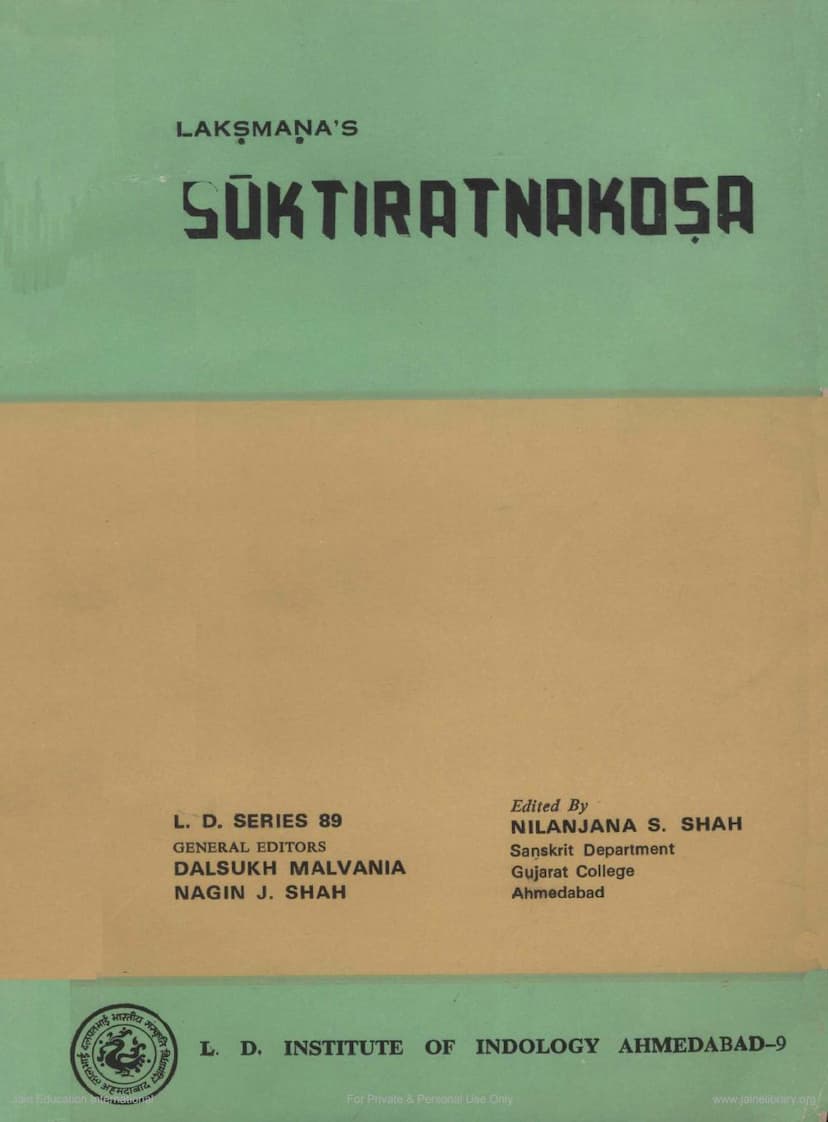Suktiratnakosa
Added to library: September 2, 2025

Summary
The provided text is the digitized version of "Lakṣmaņa's Sūktiratnakōşa," an anthology of Sanskrit verses compiled by Lakṣmaņa. Here's a comprehensive summary in English based on the available information:
Book Title: Lakṣmaņa's Sūktiratnakōşa Author: Lakṣmaņa Publisher: L. D. Institute of Indology, Ahmedabad Editor: Nilanjana S. Shah Publication Date: October 1982 L. D. Series: 89
Overall Purpose: Sūktiratnakōşa is a collection of Sanskrit verses (Subhāṣitas) intended to enlighten, amuse, and provide wisdom. While compiled by a Jain author, the verses themselves are generally secular in nature, drawing from a wide range of sources and sentiments.
Key Aspects from the Introduction and Preface:
- Manuscript Basis: The text was critically edited by Nilanjana S. Shah based on two palm-leaf manuscripts:
- One from the Hemacandrācārya Jñāna Mandir in Patan (designated as 'P').
- Another from the Śāntinātha Bhaṇdāra in Cambay (designated as 'KH').
- Manuscript Details:
- Patan Ms. (P): Dated to the early 13th century Vikram Samvat. It states the work has 680 verses and is divided into 68 sections. The title is given as Suktasamgraha. It has some unique features like separating verses for 'Virahi' and 'Virahiņi', and occasional repetition of verses.
- Cambay Ms. (KH): Dated to the first half of the 15th century Vikram Samvat. It indicates 613 verses and 61 sections. While later, it is considered more valuable as it is complete and provides some autobiographical details of the author. It has a title ŚaktiRatna-Koşa. It avoids verse repetition and includes sections differently.
- Author - Lakṣmaņa:
- Authorship is confirmed by both manuscripts.
- Lakṣmaņa himself provides some, albeit unsatisfactory, autobiographical details in the concluding verses.
- His lineage includes his great-grandfather Sarvadeva, grandfather Hamsa, and father Atyuttama. His mother was Nyāyinī.
- His stated intention was to make readers smile through the strikingness of the verses, though the anthology covers various sentiments like scorn, compassion, and description.
- No other historical reference to this Lakṣmaņa son of Hamsa as the author of Sūkti-Ratna-Koşa is found. He is distinct from an 18th-century Lakṣmaņa credited with Sūktāvali.
- The opening verses pay homage to Jina, confirming the compiler's Jain faith, but he follows compilations by non-Jaina authors.
- The Text:
- An anthology of Sanskrit Subhāṣitas.
- The Patan manuscript version contains 68 sections and 651 Subhāṣitas. The edition includes repeated verses and autobiographical verses.
- The longest section is 'Niti' (Morality) with 66 verses.
- 'Virahi' and 'Virahiņi' together have 70 verses. 'Nspa' and 'Śānta' (Peace) have 39 verses each.
- Attribution of Verses: Lakṣmaņa attributes only 20 verses to specific authors (e.g., Vidyāpati, Chittapa, Someśvara, Vālmīki, Vāruca, Trivikrama, Vararuci). The editor notes that some of these attributions are not found elsewhere and some verses attributed to Chittapa are unique.
- Sources: The editor identified sources for forty verses in about twelve well-known works, including the Bhagavadgītā, Rāmāyaṇa, Vikramorvaśīya, Amaruśataka, Bhartṛhari's Śatakas, and works by Bhāmaha, Daṇḍin, Śūdraka, Śrīharṣa, Bāṇa, Murāri, and Rājaśekhara.
- Date of Compilation: Trivikrama, a 10th-century AD author, is the latest author quoted. The earliest manuscript dates to the 13th century VS. This suggests the anthology was compiled between the 10th and 13th centuries AD.
- Comparison with Other Anthologies: The Sūkti-Ratna-Koşa shares a significant number of verses with other major Sanskrit anthologies like Subhāṣitāvali (ŚV), Śārṅgadharapaddhati (SP), Sūktimuktāvalī (SMV), Subhāṣita-Ratna-Koşa (ŚRK), and Sadukti-Karṇāmṛta (SKM).
- Other Jaina Subhāṣita Sangrahas: The introduction briefly discusses other Jaina anthologies, noting that while compiled by Jains, they are often non-Jainistic in content and drawn from various sources. Examples include Śaktamuktāvalī, Anyoktimuktāvalī, and didactic works like Amitagati's Subhāṣita-ratnu-Samdoha.
- Nature of the Anthology:
- Lakṣmaņa's collection is characterized as a treasure of "Subhāṣita-gems."
- Many verses are epigrammatic (in sections like Niti, Daridra).
- Others are purely descriptive (e.g., seasons).
- Lakṣmaņa is credited with good literary judgment for refraining from selecting offensive or erotic verses, despite sections on women and lovers comprising a significant portion.
- The edition includes all verses found in either manuscript, even repeated ones. Variant readings are provided.
Structure and Content: The Sūktiratnakōşa is organized into numerous sections, covering a wide array of themes and subjects, as indicated by the index of contents (विषयानुक्रमणिका). These include:
- Invocations: Mangalam (Benediction), Jinastuti (Praise of Jina).
- Deities: Hari (Vishnu), Shiva (mentioned in the preface, but not in the listed sections).
- General Observations & Virtues/Vices: Sujana (Good People), Khalah (Bad People), Nīti (Morality), Krpaṇa (Miser), Daivam (Fate), Vaidyakam (Medicine), Vīra (Heroism), Prakīrņakam (Miscellany), Guṇāh (Virtues), Tapah (Asceticism), Tapasvinah (Ascetics), Vidyā (Knowledge), Māyā (Illusion), Tr̥ṣṇā (Desire), Udāra (Generosity), Ravi (Sun), Saraḥ (Lake), Mr̥gaḥ (Deer), Dhaniṇaḥ (Rich People), Daridrī (Poor People).
- Human Relationships & Emotions: Putraḥ (Son), Sakhyupahāsāḥ (Jokes about Friends), Hāsyam (Humor), Cāṭupaddhatiḥ (Flattery), Vairahi/Vairahiṇī (Separated Lovers), Śrrigarāḥ (Love/Eroticism), Adbhutaḥ (Wonder), Nṛpōpalambhaḥ (Kings), Dwikam (Pairs of opposite types of people), Svānubhavaḥ (Self-Experience).
- Nature and Seasons: Vasantah (Spring), Grīṣmah (Summer), Meghah (Clouds), Śaratt (Autumn), Hemantah (Winter), Cātakaḥ (Cuckoo/Chataka bird), Bakah (Crane), Haṁsaḥ (Swan), Kokilaḥ (Cuckoo), Agastiah (Agastya), Kamalama (Lotus), Bhr̥ṅgah (Bee), Samudraḥ (Ocean).
- Specific Topics: Kāvyam (Poetry), Dūtipreṣaṇam (Sending a Messenger), Abhisārikā (Woman going to her lover), Pradōṣaḥ (Evening), Prabhātam (Dawn), Śrīḥ (Wealth/Lakṣmī), Karma (Action/Destiny), Suratam (Coitus), Dayitasyāgamanam (Arrival of the beloved).
Significance:
- Literary Value: The collection showcases a broad spectrum of Sanskrit poetic expression and ethical reflection from medieval India.
- Source for Comparative Literature: It serves as a valuable resource for scholars studying the transmission of verses and the development of Sanskrit anthologies.
- Cultural Insight: The verses offer glimpses into the societal norms, values, and sentiments prevalent during the period of compilation.
In essence, Lakṣmaņa's Sūktiratnakōşa is a meticulously compiled anthology that preserves a rich tradition of Sanskrit gnomic and descriptive poetry, edited with scholarly rigor for modern readers.